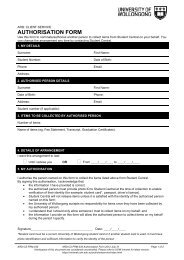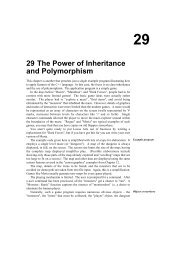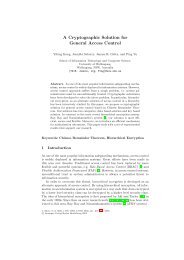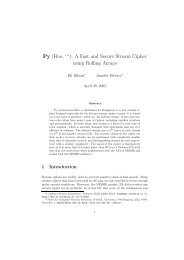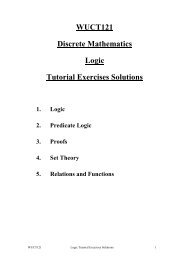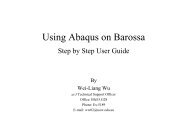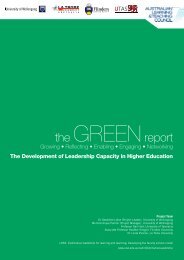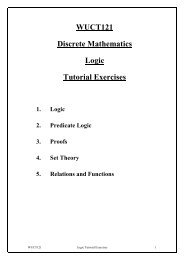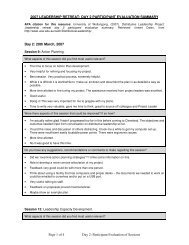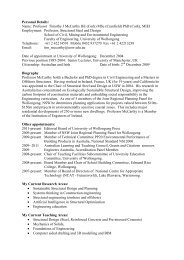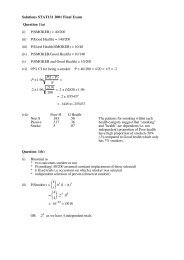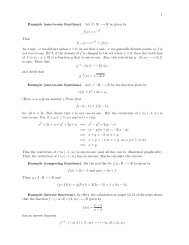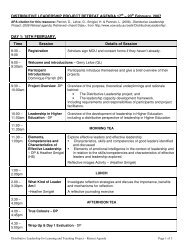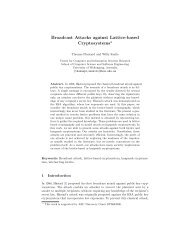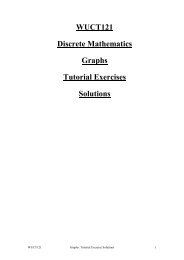india author m 1- a-nan - University of Wollongong
india author m 1- a-nan - University of Wollongong
india author m 1- a-nan - University of Wollongong
Create successful ePaper yourself
Turn your PDF publications into a flip-book with our unique Google optimized e-Paper software.
INAMDAR, F.A. "K.N. Daruwalla's Poems: Individual Response" in RAM, ATMA. ed.<br />
Contemporary Indian-English Poetry Calcutta: Writers Workshop, 1989: 86-92.<br />
KING, BRUCE. “Daruwalla’s Oxford Revisions” Littcrit 19, 10.2 (1984): 37-56.<br />
In contrast to earlier printings, the Oxford editions left-justify margins, italicise and footnote<br />
Indian terms and regulate usage <strong>of</strong> capitals and punctuation. Close reading <strong>of</strong> texts noting a<br />
general tightening <strong>of</strong> diction, less ambiguity, fewer excess similes, more regular linebreaks and<br />
a general shift to “vigorous realistic speech” , all as evidence <strong>of</strong> Daruwalla’s continuing<br />
attention to poetic craft.<br />
KING, BRUCE. "Keki Daruwalla: Outsider, Skeptic and Poet" The Indian Literary Review<br />
4.2 (1986):47-59.<br />
MOKASHI-PUNEKAR, SHANKAR. “????” [Daruwalla]Journal <strong>of</strong> Indian Writing in<br />
English 4.1 (1976): 24-?.<br />
Daruwalla as a police <strong>of</strong>ficer engages with real life and is naturally Indian in his “aliveness to<br />
the environment”. Finds his debunking irony more amusing than Ezekiel’s play with Indian<br />
English. Under Orion is more controlled than Apparitions in April. Contrasts to Santhi’s<br />
verse and compares with Rajendranath Seal.<br />
MUKHERJEE, PRASENJIT. "Relating the Subjective: An Approach to the Recent Poetry <strong>of</strong><br />
Keki N. Daruwalla" Chandrabhaga 4 (1980):51-8.<br />
NABAR, VRINDA. "Keki N. Daruwalla: Poetry and a National Culture" in SHAHANE,<br />
VASANT A. and SIVARAMKRISHNA, M. eds Indian Poetry in English: A Critical<br />
Assessment Madras: Macmillan, 1980: 28-40. Also Atlantic Highlands: Humanities, 1981.<br />
NAIK, M.K. “‘Drama Talk’: The Poetry <strong>of</strong> K. N. Daruwalla” in Naik Studies in Indian<br />
English Literature New Delhi: Sterling, 1987: 93-104.<br />
NAIK, M.K. "Landscapes and Inscapes" Kavya Bharati 1 (1988): 65-71.<br />
PRASAD, MADHUSUDAN. "Keki N. Daruwalla: Poet as Critic <strong>of</strong> His Age" Literary Half-<br />
Yearly 28.1 (January 1987):17-38.<br />
SREERMACHER, M. "The River's Argot in Three Indo-English Poets: A.K. Ramanujan,<br />
K.N. Daruwalla and Nissim Ezekiel" Poetry 10 (1986):11-13.<br />
SREERMACHER, M. "The River's Argot in Three Indo-English Poets: A.K. Ramanujan,<br />
K.N. Daruwalla and Nissim Ezekiel" Poetry 10 (1986):11-13.<br />
VENKATACHARI, K."The Idiom <strong>of</strong> Autochthon: A Note on the Poetry <strong>of</strong> Keki N.<br />
Daruwalla" in KHER, INDER NATH and CHRISTOPHER WISEMAN eds. Ariel 14.4<br />
(1983): 72-76. Reprinted in Madhusudan Prasad (ed) Living Indian English Poets New<br />
Delhi: Sterling, 1989: 66-72.<br />
Without recourse to religion, Daruwalla’s work patterns an “apprehension <strong>of</strong> man in<br />
relation to nature and his identity” as the fulfilment <strong>of</strong> historical development, and requires<br />
exploration <strong>of</strong> “the singular power <strong>of</strong> the place” (autocthon) which generates a distinctive life.<br />
Hence his ‘documentary’ cataloguing <strong>of</strong> India’s stark realities, the “dialectic <strong>of</strong> decadence and



